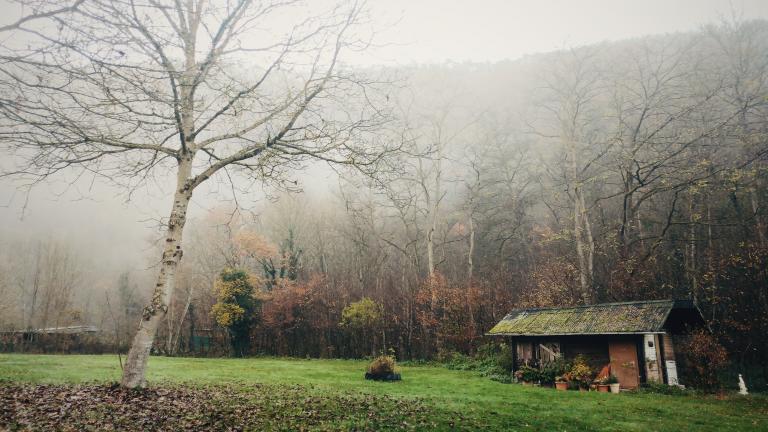
A week ago, I ordered Hillbilly Elegy by J.D. Vance, and have been working my way through it. Slowly at first. Devouring it now. The story is strikingly similar to my own, on some pages, and for once, I feel that maybe the place and family I grew up in weren’t so abnormal after all.
If you get a chance, please read it. Whether you come from the backwoods of Kentucky, New York, or out west like I do, there’s something in it for you. You’ll either walk away more keenly aware of the privileges you’ve had your entire life, the disadvantages you’ve had your entire life, or like me, the combination of privileges and disadvantages I’ve had my entire life.
I wanted to hit on one thing that was brought out in the book: the events and feelings that are some of the most common in ACEs: “adverse childhood experiences.”
If you recognize the following experiences as your own as a child, or if you recognize the experiences as the ones your children are experiencing … you might be a hillbilly (or you might not be).
One: Being sworn at, insulted, or humiliated by parents.
Two: Being pushed, grabbed, or having something thrown at you.
Three: Feeling that your family didn’t support each other.
Four: Having parents who were separated or divorced.
Five: Living with an alcoholic or a drug user.
Six: Living with someone who was depressed or attempted suicide.
Seven: Watching a loved one be physically abused.
I read the ACE list, added up my total, and it came to six. The only one I didn’t experience as a child was number five, although I saw plenty of alcoholism and drug abuse in extended family members – ones who were close to me. So all in all, I was raised pretty, uhhh … hillbilly. There were years when nothing but good went on, but the majority of my growing up years were indeed traumatic. “Adverse”, if that’s what some psychologist out there wants to call it.
If you know me well, you’ll know that my emotional, spiritual, and physical health took a toll. And though my spiritual and emotional health has come a long way in recovering, my physical health will never be the same. So what I really want to say today is this:
If you’ve experienced the same, don’t just suffer though. Get help. If you’ve read me for any length of time, you’ll know that psychology is not where I believe the answers to your hurts, perplexities and problems lie. Psychology can be a helpful tool sometimes, to understand how we tick. But the real truth lies in God’s Word. It tells me who I am (not who my father and teacher’s said I was). It tells me what I’m supposed to be doing (not what my sexual abuser or any other controlling, narcissistic, con-man told me I should be doing). It tells me my future destiny, if I am God’s. Or if I’m not God’s. It tells me that some of what I was taught was right, but it also tells me that some of what I was taught was bull crap.
Searching out the Bible for answers can be too difficult, though, especially if one is wading through a past childhood full of trauma and/or neglect. So for those who have already gone through the muck and mire of living a hillbilly lifestyle (or any lifestyle) that was “adverse”, my suggestion is to first realize that whoever raised you went through their own adverse situations growing up. We’re all imperfect humans being raised by imperfect humans and forgiveness is a wonderful healing tool in your toolbox, even though you may loathe the idea of it, depending on what mental, emotional, and spiritual state you are in at the moment.
Second suggestion is to seek out someone who has vast and deep knowledge of the Bible. The Bible can be a cryptic book. I memorized verses when I was a toddler that I didn’t fully know the meaning of until I was in my thirties. Knowing the BIble will take years. A lifetime, really. But beginning to know the Bible will put you on the right path. When you’re on a path, the next thing you do is put one foot in front of the other. Take baby steps. Hooking up with someone who has a plethora of Biblical knowledge is just a baby step – in the right direction.
What I want to say next is directed toward parents who, hillbilly or not, are imposing ACEs on their children. If, when you read the list of adverse experiences, you recognize your own behavior, again, get some help. Also, stop it. And if you can’t stop it, find out why, hunt down the reason why, and kill that reason. You can’t change your own experiences, but with God’s help, you can break the cycle. You don’t have to abuse because you’ve been abused. That will be your tendency, for sure. For all the hate J. D. Vance had for his Mom because of the trauma she put him through as a wee one, the fact was, when he grew up and got his own family, he started acting like his Mom!
It happens!
The sins of the father (or mother) visit the son ….
Recognize that, and battle it like it’s your own worst enemy, because it is. And because it’s your kids’ worst enemy, too.
When I first read the list of ACEs in Hillbilly Elegy, I was immediately angry. Scenes from my childhood went reeling through my mind, vividly …
Visiting my Mom in the psyche ward at the age of fourteen, after she tried to commit suicide a second time. Shortly afterward being sexually abused by a man in our church. Mom and Dad’s divorce. Being dragged through a bar by my mom, so I could be shown the kind of lifestyle my Dad really lived – a lyin’, cheatin’, hypocritical facade. Never feeling supported, because I was a “dingbat who’d forget her head if it wasn’t screwed on.” Watching my brothers get whipped with a metal-ringed, leather belt for a very minor offense the night before Easter. I could go on, but you get the point. Amid what I would consider a pretty privileged childhood in some respects was also a childhood full of trauma. It happens, I don’t care whether you’re raised in Kentucky, Virginia, Wyoming, Washington State, or New York.
If you’re human, you’ll likely experience an ACE at some point in your life. And if not, and you have no idea what I’m talking about, just read the book, and come to learn that not everyone is like you. Because those of us who have experienced the hillbilly, traumatizing life could use a little more understanding, love, direction, and hope. And if you don’t believe our stories, or if you think we exaggerate our stories, then you’ve joined the ranks of those who inflict wounds.
Now that I’m 46 (tomorrow), I’ve had different experiences than the hillbilly way of life. Even my childhood wasn’t full on hillbilly, but it was about 78 percent hillbilly, and that’s enough to do some damage – and good, as not all of the hillbilly lifestyle is bad. Not many folks who were born and raised in my hometown left. As J.D. Vance experienced, it’s hard to get out. One of the hardest things one might ever do. But I married out. So for nearly thirty years now, I’ve been away, only to visit on holidays and for hunting season. (Yes, hillbillies kill deer and other wildlife.)
I know two worlds now. Like the Apostle Paul, I know what it is to be in need, and I know what it is to abound. I am not rich, according to American standards. But neither am I poor, although because of my illnesses, I am much poorer than I should be had I not suffered the effects of my own sin, combined with trauma inflicted by others. You might say I’m middle class, although I don’t know what the actual means are of measuring such a status.
Point is: if you remove the trauma from the hillbilly lifestyle, you get a lot of good. There are character traits that go along with being poor and behind the rest of the world that are not “adverse.” J.D.’s Mamaw (pronounced Ma’amaw) was, in some ways, a wreck. Don’t read the book if you can’t handle an f-bomb and other profanities anytime he quotes Mamaw – and other times. But she was a loving wreck. In fact, J.D. attributes his success of being an ex-Marine and Yale graduate to Mamaw, mostly.
Hillbillies do often love fiercely. They know they’re screwed up, but they are loyal. Honest, and brutally so. Many of them are hard working. Though you may have it in your head that all hillbillies are on welfare whilst sitting around drinking moonshine and watching As The World Turns, that’s simply not true. Many of them have an excellent work ethic, and could outdo a suit-sportin’, high falutin’ lawyer any day. They believe heartily in the American Dream. They’re patriotic. Mamaw had two gods, says Vance: America and Jesus.
The Bible says we cannot serve two gods, and that’s true. But we can certainly have two gods, and hillbillies tend to go back and forth between two. We love Jesus, we do. But we also love our country and the opportunities that lie within it, and like anyone else, our priorities get real screwed up sometimes. It’s the way we are, and if you’re not that way, I truly believe that’s alright. We hillbillies will just keep joining the Marines and other military branches, and go on fighting for your right to believe whatever you want to believe.
Hillbilly Elegy has made me understand myself better. Vance wrote a book about his childhood and inadvertently explained mine to me. At least in some respects. For the hillbilly, it’s difficult to understand what defines us, and it’s even more difficult to understand what defines others. I’ll never understand the lifestyle some high society ladies live. Even when I have money, I don’t want to do what they do with their money. Our loves are different, our lives are different, our kids are different, our problems are different. Heck, even our diets are different.
And you know what? In my head, I know that’s okay … but I’m not entirely sure that it’s okay in the way our differences works themselves out. Seems mighty clique-ish out there to me, since I left home.
Do me a favor and pick up a copy of Hillbilly Elegy. You never know. You might understand me better. Or even yourself better.
Photo by joyce huis on Unsplash












